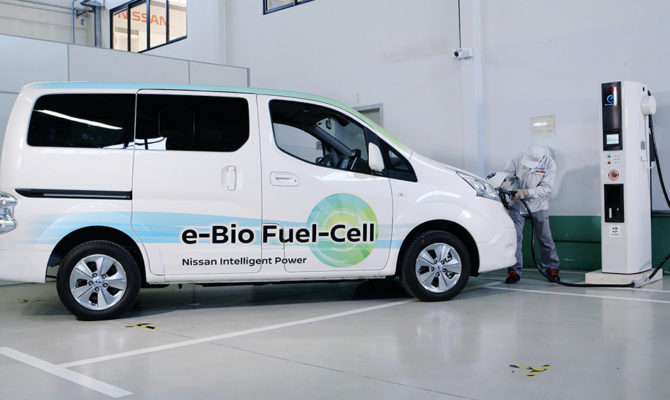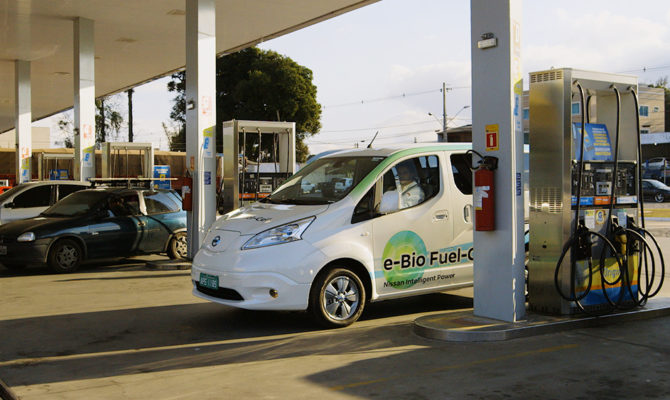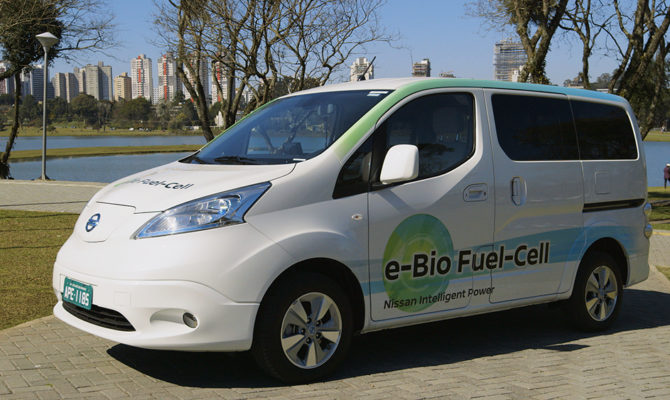Nissan has unveiled the world’s first Solid Oxide Fuel-Cell (SOFC)-powered prototype vehicle that runs on bio-ethanol electric power.
Nissan president and CEO Carlos Ghosn said: “The e-Bio Fuel-Cell offers eco-friendly transportation and creates opportunities for regional energy production…all the while supporting the existing infrastructure. In the future, the e-Bio Fuel-Cell will become even more user-friendly.
Ethanol-blended water is easier and safer to handle than most other fuels. Without the need to create new infrastructure, it has great potential to drive market growth.”
In this latest zero-emission development, the e-Bio Fuel-Cell prototype vehicle runs on 100-percent ethanol to charge a 24kWh battery that enables a cruising range of more than 600km. The Nissan prototype was introduced in Brazil during the Olympics and it will stay there for further field tests on public roads in the South American country.
The powertrain is clean, highly efficient, easy to supply, and it runs on 100-percent ethanol or ethanol-blended water. Its carbon-neutral emissions are as clean as the atmosphere, which will be the part of natural carbon cycle. Also, the e-Bio Fuel-Cell offers the brisk acceleration and silent driving of an EV, along with its low-running costs, while boasting the driving range of a gasoline-engine vehicle.
Bio-ethanol fuels are mainly sourced from sugarcane and corn. These fuels are widely available in countries in North and South America, which feature widely established infrastructure. Due to the easy availability of ethanol and low combustibility of ethanol-blended water, the system is not heavily dependent or restricted by the existing charging infrastructure, making it easy to introduce to the market.
In the future, people may only need to stop by small retail stores to buy fuel off the shelf.
Recent Comments
- { Enjoyed your Forest of Bowland in the BMW X5M, particularly the photo of the BMW in front of the main part of Stonyhurst College where... }
- { Bantam designed the Jeep, not Willy's or Ford. The American military gave the original Bantam prototype to Willys and Ford to copy. There is plenty... }
- { All Escalades come with a 6.2-lilter V8 engine that produces 420 horsepower. A six-speed automatic is the only transmission offered and drives the rear wheels.... }
- { Alexandra is an excellent journalist. }
Popular Posts
- Journey to a ‘Sparkling’ Luxury Okanagan Resort “Four lucky readers will put a Dodge Journey’s weekend-...
- The Need For Speed: Hike Those Highway Limits More than half of those polled believe the province sho...
- Drives-U-Crazy… Erratic drivers. An early morning drive from Kelowna to Vancouver is nor...
- Readers Respond: The Pros and Cons of Increasing B.C. Speed Limits Increasing the speed limits will only increase risk to...
- Honda CR-V Review: The Compact Crossover To Get Things Done The CRV is a very stylish and aerodynamic crossover veh...









